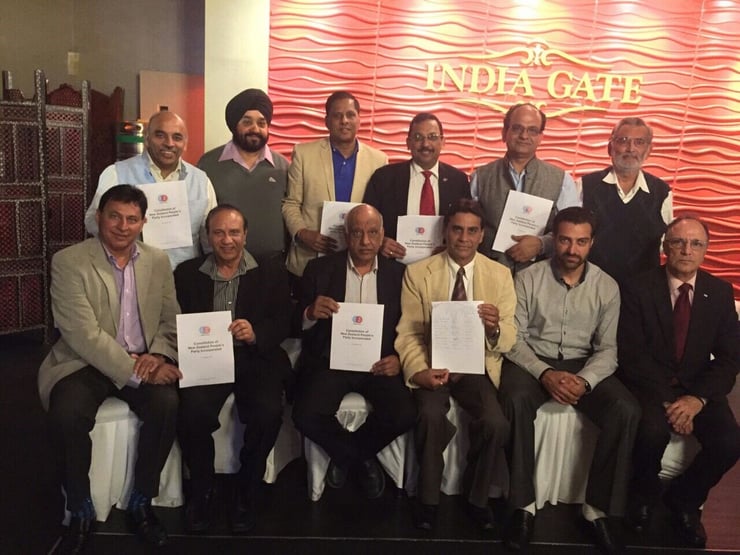New ethnic-based party creates a stir

There’s a new player on New Zealand’s political battleground.
New Zealand People’s Party, formed by successful Kiwi-Indian businessman and member of the New Zealand Order of Merit Roshan Nauhria, will focus on law and order and address the rising crime rate against Indians and Asians in New Zealand.
“The biggest issue with our people is law and order,” said Mr Nauhria. “We are always targeted...no one is listening to us. A murder happens, it is reported, the MPs and PM issues a statement, but it doesn’t solve the problem.”
The party, which was formed earlier this week, has already drawn criticism from political leaders.
Taking about the party, NZ First leader Winston Peters said: “New Zealand cannot afford to get caught up in race-based politics. No country is going to progress if we have political parties spending time accentuating their differences.
“For people to come into New Zealand and say we’re going to start an ethnic-based party is an extraordinary demand to make. They are already well-presented in Parliament. New Zealanders would not consider making such a demand in any country in Asia.”
However, Mr Nauhria said Asians contributed only 13-14% to New Zealand’s population and he felt that they were not fully represented in parliament and local council or government jobs.
“We have three Indian MPs, one Chinese and one Korean. There are so many issues concerning us, for instance, the immigration scam. Twenty per cent of the students had to go back because they were victims. Does the government know about this? Yes, but there are not doing anything. They are happy with the money that comes in.”
When Indian Weekender asked him about the allegation that a new party would divide people, he replied, “Winston Peters is only making noise. We are not doing anything undemocratic. We have the right to create a party. It is then up to the people of New Zealand to decide who they want to work for.”
Prime Minister John Key said a new party was not surprising considering the recent focus on migration.
“It’s not just Winston Peters with an anti-migrant message; it’s also been people like Labour. So you’re always going to get people wanting to make sure their voice is heard the other way,” Mr Key told the NZ Herald.
However, he added that ethnic communities would be better served by major parties selecting candidates from the communities rather than a new party being formed. “I think that’s far more effective and likely to be successful.”
Indian Weekender spoke to community leaders and politicians to know their views on the new party. Their comments below;
Veer Khar, President, Manukau Indian Association

"I support the Ethnic Expressions like the formation of NZ People's Party. The reason this party has been formed is that major political parties have not given enough hearing to these sections of NZ population.
"When we look at National, we need to ask ourselves, ‘do we really have quality representation and have we really achieved anything or has this been used just to collect funding. Look at the Labour party; they don't even seem to care at all. It is not only MPs; what about the representation in bureaucracy and 100s of government boards.
"The party may or may not be able to secure seats in forthcoming elections to get into the Parliament but a stir will definitely be created in the political spectrum. This will in turn help in real representatives of people, who actually understand and are capable.
"As far as the issue of dividing people on race is concerned, this party may gather Asian candidates, but it is open for everyone and not just Indians or Chinese. If Maori Party has a reason to be there, I think it is apt to have a party focused on other ethnic groups such as Indian or Chinese communities. I believe this is a typical outcome of a democracy. If these many (500) people want such a party to be formed, I think there is a genuine reason behind it. And whatever Winston Peters says (about dividing people on race), it is his viewpoint."
Kanwaljit Singh Bakshi, National List MP

"New Zealand is a mature democracy. We are fortunate to enjoy the fruits of living in a democracy. That anyone or a group of people can get together and form a political or any organisation is a tribute to this democracy. Any political or other organisation should be inclusive, not exclusive.
"However, I also believe that the best way to seek representation of any group is through mainstream political parties having representatives of their communities, so National has it—two Indian MPs, a Korean MP a Chinese MP. We have representation across a wide range of ethnic groups. I think that’s far more effective and likely to be a successful rule, than a standalone political party. Further, National Party has led the way in seeking representation from Asian and Indian communities. Pansy Wong was the first Asian Member of Parliament and Cabinet Minister. Other political parties have tried to follow examples set by National Party.
"Furthermore, others have tried this approach before forming a political party, however, based on their experiment, I feel that this is a waste of community resources that can be used for other fruitful purposes.
"I feel that our community should stand behind current representatives in the time to come."
Phil Goff, MP for Mt Roskill,
Labour Spokesperson for Ethnic Communities

"I know Roshan quite well. I like him. He has been a strong backer of the National Party in recent years but has clearly become disillusioned with it. We live in a democracy, so people are free to vote for whoever they want and to set up their own parties if they wish. It’s up to members of the Indian community to make their own decisions on this. Speaking for Labour, we are keen for the Indian community to be active in our party. There has been a close and longstanding relationship between Labour and the community, and I have enjoyed a strong support from it.
"I have been at meetings with the New Zealand Indian Central Association and Manukau Indian Association where I have heard strong criticism of the MPs. I think sometimes that has been a little unfair. I know that Labour will have strong representation from the community in the candidates we select for the next election.
"There is a party already based on race—the Maori Party. My own preference is for parties that represent all ethnicities. What divides people is race-based comments that politicians sometimes make."
Priyanca Radhakrishnan, Elected member, Labour Party Policy Council,
Former Labour List Candidate (2014)
 "New Zealand is a democracy. People have the right to form political parties and a responsibility to vote for the parties and candidates they want in Parliament.
"New Zealand is a democracy. People have the right to form political parties and a responsibility to vote for the parties and candidates they want in Parliament.
"I joined the Labour Party 10 years ago because the Labour values—of social justice, and fairness of opportunity for all regardless of race, religion, sex or social standing—reflect my own. Over the past 100 years, Labour has driven significant progressive change for New Zealanders. Labour has also been vocal on issues that disproportionately affect migrants—the Office of Ethnic Affairs and a comprehensive settlement support strategy are just two examples.
"I strongly believe that our Parliament should reflect and represent all of us. Ethnic MPs are well-placed to contribute based on individual expertise and on issues that disproportionately affect ethnic communities.
"While it’s important for MPs to be held accountable by those who elect them, I suspect we may be a bit harsh on ethnic MPs who have a disparate electorate of about 500,000 people to represent. As Dr Rajen Prasad said in his valedictory speech, it is potentially more difficult for ethnic MPs to have a strategic impact in Parliament because the structures they operate within are largely monocultural. While this must change over time, a new party in Parliament in the current climate will be operating within the same structures and limitations."




